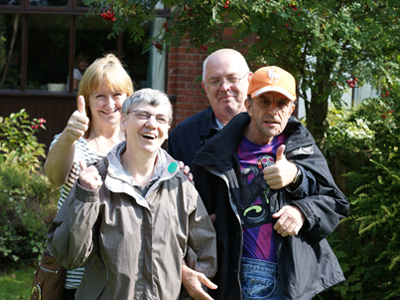
Annual growth in the use of Shared Lives schemes has slowed for the second year running, a report has found.
Umbrella body Shared Lives Plus found the number of people using the schemes grew 5% in 2015-16. This compared to 11% growth in the previous year and 14% in 2013-14.
The Shared Lives model sees individuals and families use their homes to provide care and support to adults with needs on an ongoing basis, as a short break or as a day service.
The schemes supported 11,880 people in 2015-16, with 71% having a learning disability as their main support need.
Shared Lives Plus said the model “outperforms” other models of regulated social care services, with 95% of schemes rated good or outstanding by CQC and none rated inadequate. They argue that shifting resource to Shared Lives from other forms of care can save money and improve outcomes for service users.
The report found schemes in the North West, South West and London regions all grew significantly in 2015-16. Nationally, the number of people with mental health issues accessing the schemes also rose 23%, the number using shared lives day support arrangements increased 11% and live-in arrangements grew 11%.
However, a drop in the number of people using Shared Lives in the South East, Yorkshire and the East of England had led to a “slow-down in overall growth”, the report said. Shared lives short-breaks also decreased 3%.
Anna McEwen, Executive Director of Support and Development at Shared Lives Plus, told Community Care the pressures on council finances and eligibility decisions were having an effect.
“In some areas people who previously received a Shared Lives service have been deemed ineligible. In some areas we’ve seen changes to council charging policies, particularly in short-breaks, that have made it unaffordable for people to have a short break,” she said.
“Things are so tight in commissioning in the moment. But in some areas you have forward thinking commissioners who are thinking this should be one of the answers to the challenges we face in social care. “
The report also noted a slowdown in the growth in the number of shared lives carers coming forward each year. It called on the government to launch a national recruitment campaign to help raise the profile of the role.
“Historically shared lives carers have been recruited through word of mouth, so people tell their friends, and it’s an organic process that people become shared lives carers,” said McEwen.
“What we’re trying to do now is develop the sector at more pace. To do that, we need different ways of recruiting more carers. One problem we face is that people don’t necessarily know what Shared Lives is – they haven’t heard of it. So we need some way of nationally raising awareness of Shared Lives.”


 Bournemouth, Christchurch and Poole
Bournemouth, Christchurch and Poole  Hampshire County Council
Hampshire County Council  Lincolnshire County Council
Lincolnshire County Council  Norfolk County Council
Norfolk County Council  Northamptonshire Children’s Trust
Northamptonshire Children’s Trust  South Gloucestershire Council
South Gloucestershire Council  Wiltshire Council
Wiltshire Council  Wokingham Borough Council
Wokingham Borough Council  Children and young people with SEND are ‘valued and prioritised’ in Wiltshire, find inspectors
Children and young people with SEND are ‘valued and prioritised’ in Wiltshire, find inspectors  How specialist refugee teams benefit young people and social workers
How specialist refugee teams benefit young people and social workers  Podcast: returning to social work after becoming a first-time parent
Podcast: returning to social work after becoming a first-time parent  Podcast: would you work for an inadequate-rated service?
Podcast: would you work for an inadequate-rated service?  Family help: one local authority’s experience of the model
Family help: one local authority’s experience of the model  Workforce Insights – showcasing a selection of the sector’s top recruiters
Workforce Insights – showcasing a selection of the sector’s top recruiters 

 Facebook
Facebook X
X LinkedIn
LinkedIn Instagram
Instagram
Comments are closed.